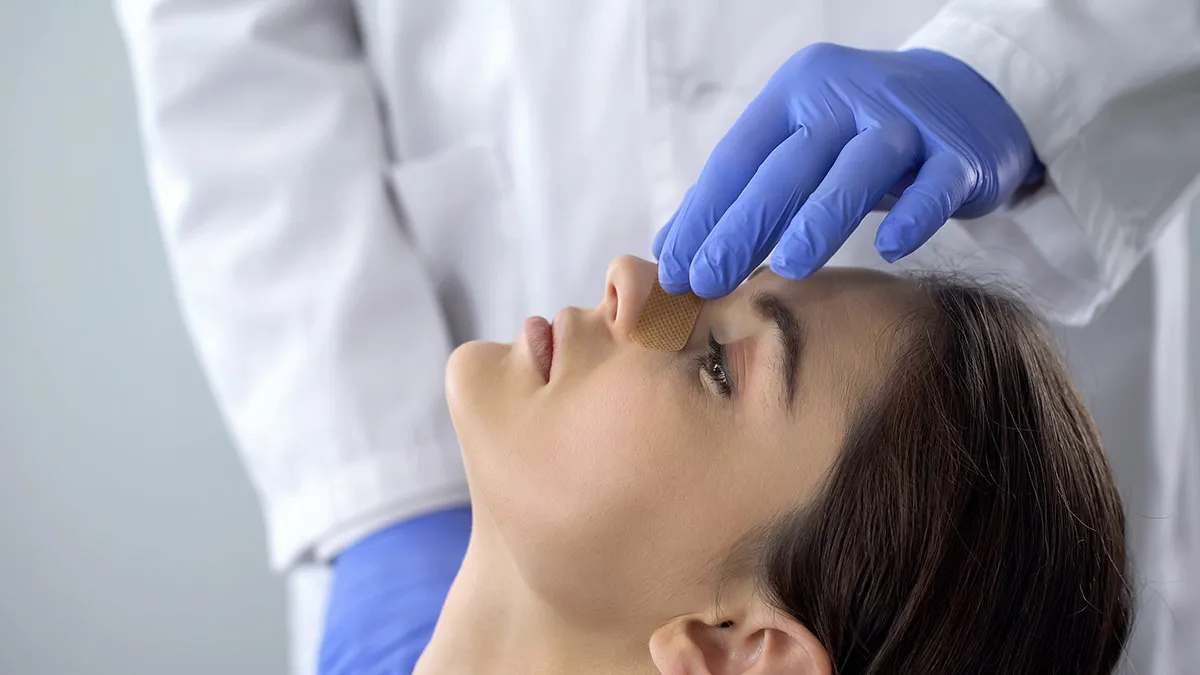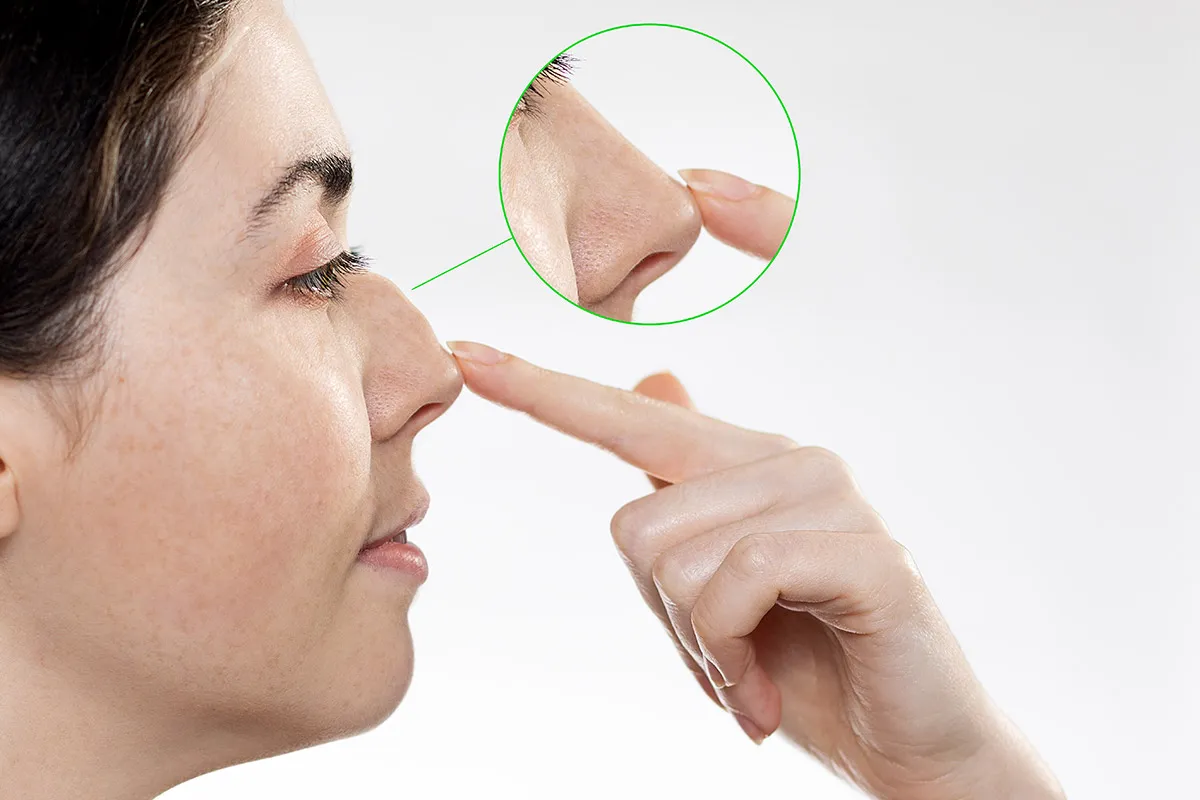Rhinoplasty
The shape of your nose is primarily determined by genetics, but it can be altered by injury or trauma. Rhinoplasty, or nose reshaping surgery, is a solution for reshaping the nose in such cases. It’s also recommended for individuals unhappy with their nose shape and seeking more facial balance.
Rhinoplasty surgery in Dubai can enhance your self-esteem and confidence by improving your overall appearance. Additionally, it can address breathing issues caused by structural defects in the nasal passage.
Rhinoplasty, also known as a nose job or nose reshaping plastic surgery, is a procedure designed to alter the shape or improve the function of the nose. It can be performed for both cosmetic enhancement and medical reasons. Typically, rhinoplasty involves modifying the bone, skin, cartilage, or a combination of these elements.


Rhinoplasty enhances facial symmetry by reshaping the nose to harmonize with other facial features.
The procedure improves the overall shape of the nose, addressing issues such as bumps or dips on the bridge.
By altering the nose’s appearance, rhinoplasty enhances overall facial aesthetics and attractiveness.
It helps achieve a balanced appearance by adjusting the size and shape of the nose relative to other facial structures.
Rhinoplasty can refine the shape and size of nostrils for a more proportionate look.
The surgery can reduce the prominence of the nasal bridge and refine the nasal tip for a more pleasing contour.
At Aesthetics International in Dubai, our rhinoplasty surgeon evaluates candidates through comprehensive exams and medical history assessments to determine suitability for the procedure. Generally, individuals eligible for rhinoplasty typically have:
Candidates should be in good health to undergo surgery and recovery effectively.
Understanding the potential outcomes of rhinoplasty and having reasonable expectations regarding the results.
Those with nose deformities affecting appearance or causing breathing difficulties are often candidates.
Individuals who have experienced accidents resulting in nose-bone damage may benefit from rhinoplasty to restore both function and appearance.

Rhinoplasty is an outpatient procedure that includes making incisions and reshaping the nose. The place of the incision depends on the surgery technique. The two most common rhinoplasty surgery techniques are:
Open rhinoplasty involves a small incision made under the nasal tip between the nostrils. This allows the surgeon to access the nasal structures and sculpt the nose into your desired shape. The outcome is a more personalized result tailored to your requirements.
This technique involves incisions made inside the nostril and is good for patients requiring more minor nose adjustments. Compared to open rhinoplasty, it offers limited visibility to the surgeon. Also, they do not gain access to the entire nose structure. This is why it is only suitable for those who require a small cosmetic change.
During the initial consultation at Aesthetics International in Dubai, your surgeon assesses your reasons for rhinoplasty, discusses potential outcomes, and conducts a comprehensive physical exam, including photographs and lab tests if necessary. Before proceeding, address any concerns or questions about risks and check out rhinoplasty before-and-after photos to make an informed decision.
Preparation involves dietary restrictions, medication adjustments, and avoiding smoking and alcohol. Arrive at the clinic makeup-free and without jewelry on the surgery day.
The procedure involves anesthesia, incisions based on the type of rhinoplasty, reshaping nasal structures, and possibly correcting a deviated septum for better breathing. The incisions are closed after reshaping and repositioning nasal skin and tissue.
Post-surgery, expect a splint for support and temporary nasal packing. Discomfort, congestion, bruising, and swelling are normal, with most patients returning to normal activities within 2 weeks. Avoid strenuous activities for 4 weeks.
Rhinoplasty surgery enhances the aesthetic appearance of your nose and corrects breathing difficulties caused by deformities. Initial results appear within two weeks, with the final shape taking up to 12 months to fully settle. Depending on the procedure’s complexity, follow-up visits with your doctor may be required.
While rhinoplasty results are typically permanent, the nose’s shape can subtly change over time due to natural aging. Maintaining long-term results involves adopting a healthy lifestyle and protecting your nose from sun exposure.
Consider Rhinoplasty if you're experiencing constricted breathing or dissatisfaction with your nose's appearance. While younger individuals can undergo Rhinoplasty, experts recommend waiting until mid-teens when the nose stops growing.
The cost varies based on factors like surgery type and purpose. Clinic selection for nose reshaping in Dubai also influences costs. During your initial consultation, the surgeon will assess your condition and medical history to provide a cost estimate.
Yes, Rhinoplasty surgery leaves scars, which vary by patient depending on natural healing and incision location. Typically, scars refine into fine incision lines within a year post-surgery.
The procedure itself is painless under anesthesia. Post-surgery, expect bruising and swelling for 1-2 weeks. Pain medication prescribed by the clinic helps manage discomfort. Follow your surgeon's guidance for proper healing.
The procedure typically lasts 30-60 minutes, though timing may vary based on factors like complexity.
While generally safe, Rhinoplasty carries risks like anesthesia issues, infections, numbness, and breathing problems. Revision surgery may be necessary to achieve the desired results.
Results depend on the surgeon's expertise. Inexperienced surgeons may lead to unsatisfactory results. Aesthetics International ensures your Rhinoplasty meets your highest expectations with our team of top cosmetic surgeons.